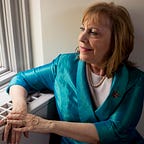An Open Letter To Catholic Bishops
At an online retreat this weekend, those of us who attended were invited to consider the “gentle, tender invitation into the heart of God” we are experiencing. This letter emerged from that invitation.
Dear U.S. Conference of Catholic Bishops:
As you begin drafting a statement on Holy Communion that could affect Catholic public figures, I offer these few humble thoughts.
I write as one who has attended daily Mass for years. Every time I approach the altar to receive communion, I feel the full weight of my own unworthiness. The moment, though, that I receive the communion wafer in my hand, I begin to feel something else — immense gratitude.
In that instant, I experience the love and mercy of Christ — a love so vast that Christ allows himself to become present within me. A mercy so profound that Christ accepts me despite my human flaws and misjudgments.
The fact is that we are all imperfect. We are all, in some way, broken. To turn some sins into a pecking order, and to deem some of us more or less worthy than others, is to defy the example of Jesus. He ate with outcasts, saved a supposedly immoral woman from stoning, and repeatedly said the one thing necessary is to love, love, love.
Dear fathers, before you assemble your statement on “The Meaning of the Eucharist in the Life of the Church,” I offer these suggestions. A few simple acts will lend far more credibility to any guidance that you eventually give.
First, I suggest that each one of you spend a month at the U.S. border, handing out food, water , clothing and spiritual support to the families seeking asylum and the chance for a better life in the U.S. They are like the “traveler on the road” in St. Luke’s parable of the Good Samaritan, beaten, robbed and left for dead.
We are called to emulate the compassion of the Samaritan stranger who stopped to help, when others, including a priest, passed by.
Two Benedictine sisters from the monastery where I am a lay associate are helping right now in Laredo, TX. Other lay associates of my monastery will assist at the San Diego border later this month. They can help you with arrangements for working there. (I hope to go myself later this summer).
In addition, I recommend each one of you invite to dinner a young adult who has turned away from the institutional church. Perhaps start by contacting a few of the twenty-something members of the Nuns & Nones group. These are young adults who have been seeking direction from our Catholic Sisters. Why? Because they see in the work of so many of our Sisters as the gospel in action.
These young people yearn for a sense of community and a more just world. They are deeply concerned about inclusivity, income equality, racial justice, and care of creation. For them, the church is not a building. Church is in the streets.
I also urge you, my brothers, to pay closer attention to what Saint Pope John XXIII called “the signs of the times.” As our nation was suffering the deaths of so many of its most vulnerable citizens last year from COVID 19, I wish I had heard more from all of you about creating a U.S. health care system that is just for all, and not only the privileged.
It is not too late to make your voices more boldly heard.
When our citizens take to the streets to plead for equal justice and treatment under the law, would it not be possible for some of you to place yourselves at the head of marches, as so many Catholic priests did in the Civil Rights era?
When my own community held an online prayer service after the death of George Floyd, our sole rabbi and Hindu priest as well as leaders in the Protestant, Moslem, and Baha’i faith communities participated. Not one local Catholic priest agreed to offer a prayer at the service.
Finally, I would beg you to give the same attention to protecting children who are in the world as you do to children in the womb. To do so would mean advocating just as strongly for the rights of immigrant children, the best health care possible for mothers and children, proper nutrition for the young, eliminating child poverty, and early childhood education.
I ask you to choose listening over issuing edicts, dialogue over conflict, compassion over punishment, loving action over bitter words. I ask you to be healers, not dividers. And I promise to do the same in my own life.
Yours in Christ,
Judith Valente
